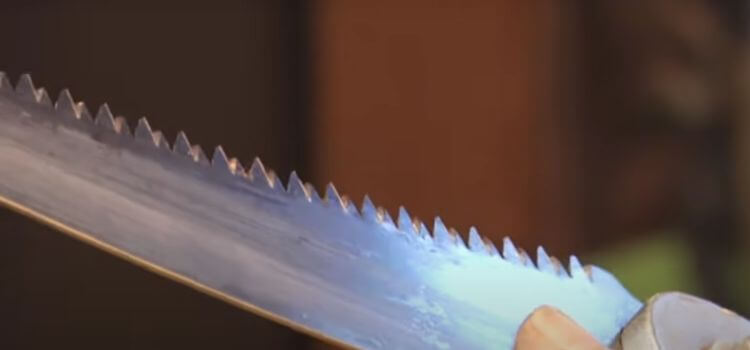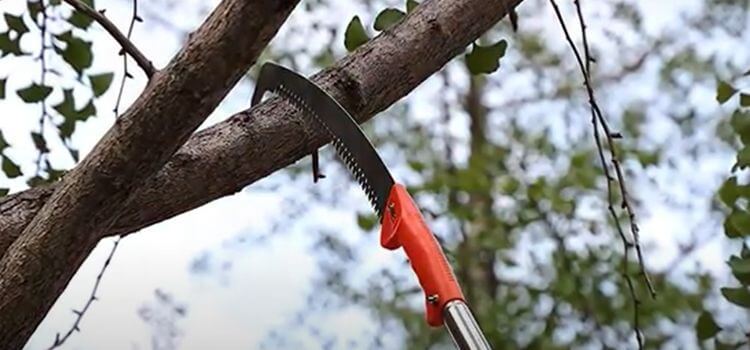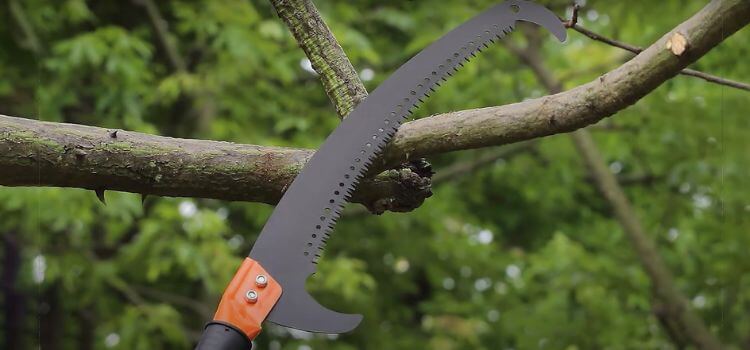As an Amazon Associate, I earn from qualifying purchases.
Keeping your pole saw in top condition is essential for efficient cutting and safety. One of the most crucial maintenance tasks is sharpening a pole saw blade. You should know how to sharpen a pole saw blade if you have a pole saw.
This is a complete guide to each step of sharpening a pole saw blade actually and effortlessly.
The Pole Saw Blade
Before diving into the sharpening process, it’s important to familiarize yourself with the blade. Pole saws typically have a thinner, more flexible blade than other pruning saws. It’s designed for cutting in tight and awkward spaces. The parts of the blade include the cutting teeth, gullets, rakers, and depth gauges. Each plays a crucial role in the saw’s function and sharpness.
The Anatomy of the Blade
A standard pole saw blade consists of several key parts:
- The Cutting Teeth: These sharp, forward-pointing teeth do the actual cutting.
- The Depth Gauges: Also known as rakers, these sit between the cutting teeth and control the depth of the cut.
Signs of a Dull Blade
How do you know when your pole saw blade is due for a sharpening? Look out for these common signs:
- Ragged or Torn Cuts: If you notice that the cuts are no longer clean, your blade is likely dull.
- Excessive Vibration: A dulled blade can cause the saw to vibrate more than usual.
- Blade Overheating: More effort is needed when using a dull blade, which can lead to overheating.
Tools Needed for Sharpening Pole Saw Blade
One of the most significant elements in sharpening your pole saw blade is having the right tools. The essential items are:
File
A round or flat file is the foremost tool for sharpening. The file size should match the size of the teeth on your blade.
Vice or Clamp
You’ll need a stable working station, such as a vice or clamp, to properly secure the blade and file.
Safety Gear
Safety should be your top priority when working with sharp tools. Wear gloves and eye protection to prevent injury.
Gathering these materials before starting the sharpening process will streamline the operation.
Step-by-Step Sharpening Process
Here’s a step-by-step guide to sharpening your pole saw blade:

Step 1: Cleaning the Blade
Before any sharpening begins, it’s important to clean the blade. Use a wire brush to remove wood resin, dust, and other debris clinging to the blade. Inspect it for damage and excessive wear that may require replacement. This will allow you to see the condition of the teeth clearly and prevent any contaminants from affecting the sharpening process.
Step 2: Securing the Blade for Sharpening
Ensure the pole saw is turned off and the battery (if applicable) is disconnected. Then, secure the saw blade using a vice or a specialized tool designed for holding the blade in place during sharpening. This step is crucial; the blade should be held securely, allowing just the teeth to be exposed.
Step 3: Filing or Grinding the Blade
With the blade secured, start the sharpening process by working on the first tooth. If you’re using a file, always push the file toward the cutting edge. Professionals refer to this as sharpening ‘from the inside out,’ which provides a cleaner cut. Be sure to apply even pressure and maintain the angle of the tooth profile as you work.
If you’re using a grinding attachment for a rotary tool, you must maintain regular water soakings to keep the blade cool and avoid overheating. Grinding provides a faster sharpening, but you must be cautious not to remove too much metal.
Continue sharpening each tooth until you return to the starting position. Rotate the blade (not the tool) to access new teeth to sharpen. Marking the first tooth with paint or a marker will help keep track of your progress.
Step 4: Testing the Sharpness
After all the teeth are sharpened, remove the blade from the vise or sharpening tool and check it closely. Run your fingers lightly over the teeth; they should feel uniformly sharp. Also, test the blade on a wood block — the saw should cut with much less opposition than before.
Step 5: Clean and Oil the Blade
Remove any metal filings or debris from the blade and apply lubricating oil to protect it from rust.
Safety Tips: How to Sharpen a Pole Saw Blade
Sharpening a pole saw blade involves working with a sharp object and power tools, so safety should be the priority.
Working with sharp tools requires caution. Always wear protective gear, and never attempt to sharpen a blade while it’s attached to the power tool.
Following these guidelines will help you stay safe and avoid unnecessary accidents during the sharpening process.
Maintenance and Care
In addition to sharpening, regular maintenance is key. Keep the blade clean after every use, and inspect it for any metal fatigue or damage. Store the saw properly to avoid harm to the blade or teeth.

Keep an eye on the teeth for signs of wear, and sharpen them before they become too dull. Regular attention to your pole saw’s blade will prolong its life and keep it operating at peak efficiency.
FAQ: How to Sharpen a Pole Saw Blade
Absolutely! You can hand sharpen your pole saw blade with the right tools and patience. Remember to wear safety gear and follow the manufacturer’s instructions or a reliable guide.
You will need a round file, a flat file, a filing guide, a clamp or vise, and safety equipment like gloves and goggles.
If cutting becomes difficult, the saw produces sawdust instead of chips, or the blade pulls to one side and likely needs sharpening. Regular inspection for dullness or damage can also indicate maintenance is required.
The frequency depends on usage and the materials you’re cutting. Inspect the blade after each use and sharpen it when you notice reduced effectiveness.
Yes. Secure the blade and work on one tooth at a time, following the bevel angle. Use smooth, even strokes with the round file, typically 3-5 strokes per tooth.
Yes, but it requires steady hands and experience to prevent damage. Hand filing is recommended for beginners for better control.
Conclusion: How to Sharpen a Pole Saw Blade
In conclusion, sharpening your pole saw blade can be a manageable task. Following this guide, you can maintain a sharp knife that provides clean, efficient, and safe cuts.
Remember to sharpen your blade at the first sign of dullness and prioritize safety throughout the sharpening process. So, hold your gloves, secure your blade, and embark on a smooth, safe pole saw sharpening experience with this guide.

